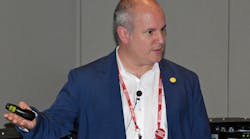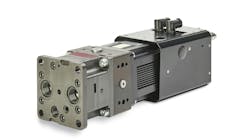"The juice plant's production lines are more flexible and adaptable than ever, while keeping their regulatory records automatically. We were even able to reduce production's footprint in the plant, reduce power consumption, and increase some batch sizes by 50%." Pedro Ollier of LC Tech Group discussed a recent project for Mondelēz to upgrade automation using PlantPAx and FactoryTalk software from Rockwell Automation.
Keeping up with dozens of raw materials and juice drink recipes, and producing consistent product is plenty challenging to begin with. However, responding fast enough to today's rapid and even brand-threatening shifts in consumer tastes and trends is even harder.
To meet and overcome these challenges, Mondelēz Argentina recently worked with system integrator LC Tech in Buenos Aires on an eight-month project to automate its formerly manual powder blending and juice plant in Villa Mercedes, Argentina. This project included a new PlantPAx process control system, several varieties of FactoryTalk software and related tools, and even integrating stationary vessels and automated guided vehicles (AGV) carrying 2,000-kg loads of materials.
"This plant focuses on making drinks like Royal, Tang and Clight, and as it does with its other well-known brands, a key Mondelēz goal is 'snacking made right,'" said Pedro Ollier, account manager, LC Tech Group, which consists of more than 20 engineers, has completed more than 920 projects in seven countries, and is a Rockwell Automation Recognized System Integrator.
"Mondelēz uses three strategic principles to achieve this goal: accelerating consumer-centric growth, execution by driving operational excellence, and building a winning growth culture. However, consumer and consumer packaged goods (CPG) models have been changing dramatically due to rapidly evolving channels, the digital revolution, emerging insurgent brands, well-being initiatives, local product relevance, and speed of production and delivery."
Ollier presented "How Mondelēz achieved flexible manufacturing with PlantPAx and FactoryTalk" on the second day of Process Solutions User Group (PSUG) before the opening of Rockwell Automation Fair 2019 this week at McCormick Place in Chicago.
Migration motivation
Ollier reported that the juice plant's essential processes are: dry powder blending; raw ingredients management; macro, medium and micro dosing; mixing with lab-based quality control; packing; and end-to-end traceability.
"All of these functions used to be fully manual and documented on paper," said Ollier. "However, these processes also have some special features because we're dealing with 100 different raw materials, recipes and dosing variabilities. The challenge is sorting them all out to achieve and maintain product consistency, especially in the face of threats to the CPG model, cost optimization, flexibility and traceability.
"The plant's process should be adaptable to the modern market's speed of change, so Mondelēz had several decisions to make, such as using the CFR 21, Part 11 standard for batching and traceability," explained Ollier. "It's also started migrating from batch units using 12 fixed bins or vessels to mix powders to coordinating with six moving AGVs that can carry 2,000 kg of materials to there they're needed. Mondelēz has some experience with AGVs and wanted to do more."
Adapt and adopt automation
With help from LC Tech, Mondelēz balanced all of its production requirements and responsibilities by implementing a PlantPAx DCS solution to enable operators to make correct decisions, better manage recipes without requiring users to have programming skills, help maintain material traceability records, and provide more accurate and timely data and key performance indicators (KPIs).
Additionally, the use of ThinManager and VersaView thin-client software allows users to access production overviews on many platforms and devices.
"We also installed a ControlLogix controller to serve as an orchestra conductor that could integrate all these devices and software, and used Stratix switches with EtherNet/IP networking to create a data highway for sharing all their data," added Ollier. "These solutions allowed Mondelēz to reduce dosing variability by better matching dosing devices based on quantities to be dispensed. ControlLogix, FactoryTalk Batch and ThinManager minimized required operator activities. FactoryTalk Batch and FactoryTalk Material Manager increased flexibility for new recipes and products. Implementing software-based templates improved reporting flexibility for batches, ingredients, recipes and production dates. Finally, virtualization and PlantPAx library templates accelerated engineering and deployment."
New and future gains
Ollier added that Rockwell Automation's platforms and software also enabled it to optimize its recipes, relocate its raw materials, adjust its dosing sequence, automate reporting, and implement CFR 21, Part 11 traceability with quality assurance protocols, even to use digital signatures.
"The plant's production lines are more flexible and adaptable than ever, while keeping their regulatory records automatically," he said. "We were even able to reduce production's footprint in the plant, reduce power consumption, and increase some batch sizes by 50%."
In the future, Ollier reported that Mondelēz plans to use automation and its various software solutions to further improve with sustainable dosing and production line optimization; enhance quality with enterprise resource planning (ERP) and near infrared (NIR) spectrometry for homogeneity measurement; and enable its analytics and manufacturing executing system (MES) with better production planning, predictive ingredients management and automated raw materials supply.






